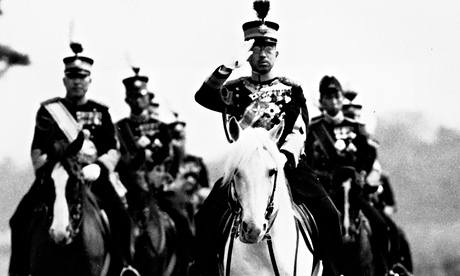
Japan's wartime emperor, Hirohito, congratulated his forces on victories as the country made a brutal sweep across mainland Asia but warned that an attack on the US would be "self-destructive", according to a new biography.
The first official record of Hirohito's thinking during a tumultuous period in Japan's history, released by the imperial household agency this week, offers a largely sympathetic view of the monarch, whose 62-year reign spanned his country's descent into militarism, its wartime defeat and its dramatic postwar economic development.
Hirohito was alarmed by political leaders' intentions in the runup to the December 1941 surprise attack on Pearl Harbor, according to the biography, describing the prospect of conflict with the US as a "reckless war" that would make him "deeply sorry for my imperial ancestors".
He had expressed similar doubts about the "predisposition" of army leaders who waged war in China in the 1930s, but he celebrated victories by troops who fought in his name.
After Japanese troops invaded the Chinese city of Nanking (now Nanjing) in 1937, slaughtering tens of thousands of civilians, Hirohito said he was "deeply satisfied" by the troops' courage in quickly seizing the city. The annals contain details of how the city was besieged, but make no mention of the atrocities, Japanese media said.
The 12,000-page biography of Hirohito, posthumously known as the Showa Emperor ("enlightened peace"), took 24 years to compile at a cost of 230m yen (£1.34m).
But the records, released to selected members of the Japanese media before general publication, failed to settle the longrunning debate over the extent of Hirohito's involvement in the decisions that ultimately led to the atomic bombings of Hiroshima and Nagasaki, and Japan's surrender in August 1945.
Some historians insist that as a revered demi-god and commander in chief of the imperial forces, he bore responsibility for Japan's actions in the 1930s and 40s. Others insist that, despite his status, key decisions were taken by military leaders.
The Mainichi Shimbun, a liberal newspaper, said the records simply confirmed the established narrative of Hirohito's reign. It "hardly contained anything new that reverses conventional wisdom and history", the paper said in an editorial. "We must keep asking ourselves why that catastrophic war could not be avoided. That question is hardly resolved."
Other commentators speculated that the biography was still incomplete and wondered how much material had been omitted by the imperial household agency.
Hirohito's subjects had never heard him speak until he announced Japan's defeat in a four-minute radio address on 15 August 1945. According to the records, the leader of the US occupation, Gen Douglas MacArthur, is quoted as saying that Hirohito had told him during their first meeting on 27 September that year that he accepted "sole responsibility" for Japan's wartime conduct.
Hirohito was informed of the bombing of Hiroshima almost 12 hours after the city was flattened. Two days later, the records say, he was convinced that it had "become impossible to continue the war" and hoped the conflict would end "as swiftly as possible".
Despite calls for Hirohito to be tried as a war criminal, the US occupation authorities allowed him to remain on the Chrysanthemum throne to ensure political stability amid fears of communist influence. He renounced his divinity, but remained a potent national symbol until his death in 1989.
The records cite a 2006 newspaper article in which a palace official is quoted in a memo as saying that Hirohito had been displeased by the earlier decision to enshrine class-A war criminals at Yasukuni, a shrine in Tokyo that honours Japan's war dead. The memo, however, is not included in the newly published material, and no mention is made of Hirohito's own comments on the Yasukuni issue.
The full report will be published in stages over the next five years, starting in March.

